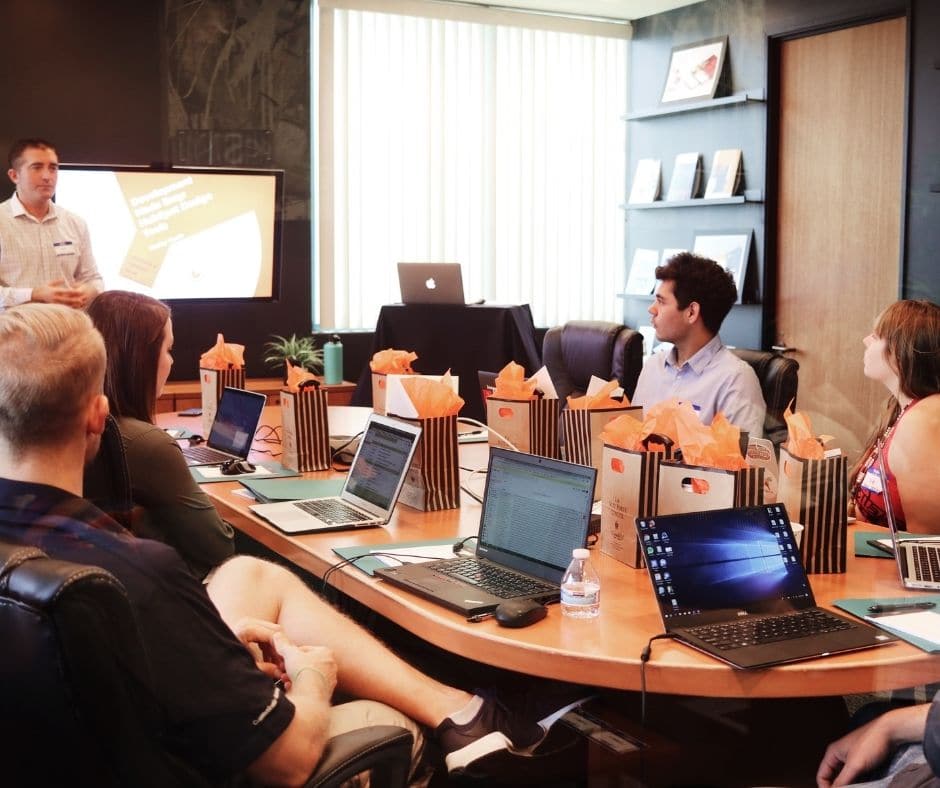
Whether you work remotely or on-site, meetings can be a drag, be it in-person, video, or conference calls. Meetings cost individuals time and companies money. Even in the comfort of your own home, conference calls can be frustrating. Getting the most out of meetings requires an energetic facilitator that empowers rather than exhausts the participants.
The meeting leader needs to be engaging and mindful of the time to discuss pertinent business matters. With many video calls, the host and attendees need to be aware of and possess etiquette. Common disruptions include dogs barking, doorbells ringing, children in the background, and improper attire. Every great meeting begins with proper planning and preparation to be impactful and purposeful. You can set your expectations by informing members to be in a quiet setting.
Gary B. Wilson, an organizational development expert, gives practical tips in A Trainers Guide to Better Meetings. Four components of a successful meeting include Information, Procedure, Interaction, and Evaluation. In today’s age, attention spans run short, so having a 15–20-minute call can be just as productive as devoting an hour to business matters. Opening up video calls earlier will help participants ensure they have no technological issues. If they do, they have time to notify you and troubleshoot any problems.
Here are some tips to streamline all types of meetings:
- Lay Out The Agenda:
Create an outline of the meeting’s topics and distribute it to all group members before the meeting. You can send out helpful information to all attendees, including the date, time, location, access codes, and list of talking points. A simple email invitation allows attendees to add it to their calendar and plan for it. Practicing this procedure will set the group dynamic in motion, and they will know what to expect.
- Stay on Point:
The meeting’s facilitator should adhere to the list of topics planned and follow the order. If the group gets off track, the leader can get them to refocus by shifting the discussion. Commanding the meeting will define boundaries but also communicate the host’s mindfulness of everyone’s time. The object of meetings is to exchange information or ideas that are based on the company’s goals. Deviating from the noted talking points may create frustration, boredom, and confusion.
- Participation:
For a meeting to be meaningful, it requires participation from all members, not just the facilitator. Engaging all group members and getting them to interact will energize them. Meeting participants do not want to sit and listen to only one person talking. Hearing one voice decreases attention and enthusiasm. By having smaller groups attend meetings, you can keep it short, increase participation, and build cohesiveness.
- Evaluation:
End the meeting on a positive note and ask each member if they have anything to add or any questions. Calling on each participant at the end clarifies understanding and allows everyone to provide input. Be sure to thank everyone, and you can also gather feedback privately afterward for evaluation. As a facilitator, you want to know what works and what does not to improve any shortcomings.
Meeting facilitators can also get a sense of each group member’s strengths and opportunities. Leaders can reach out privately one-on-one to further explain the goals or offer assistance with any potential struggles. Despite the digital age, humans still crave interaction and meaningful communication. If you oversee a remote workforce, personally checking in on team members will increase productivity and retention. Meetings offer a source of communication, which is fundamental to success.
